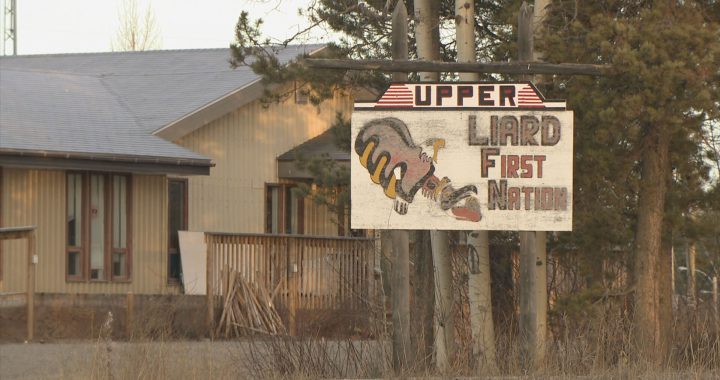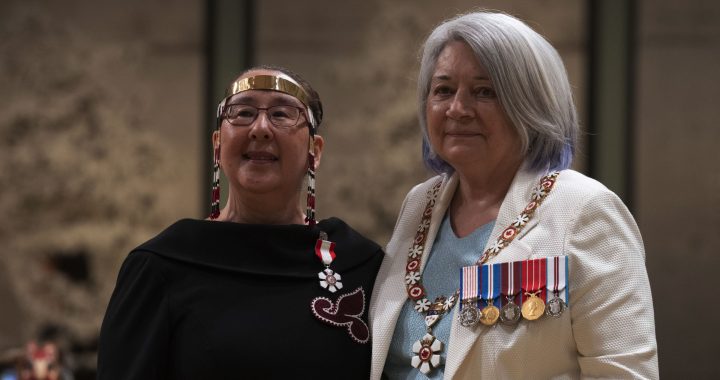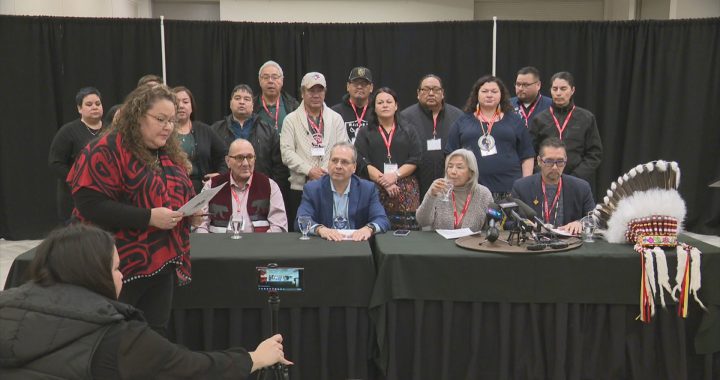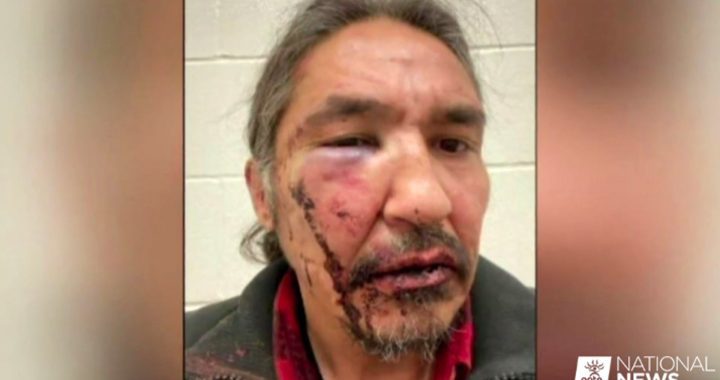(Cree Elder Johnny Grant was charged with tobacco smuggling after he crossed the Canada-U.S. border. APTN/Photo)
Jorge Barrera
APTN National News
Wearing a ribbon shirt and gripping an eagle feather, an Elder from Waswanipi, a Cree community in northern Quebec, told a courtroom in Cornwall, Ont., Tuesday his rights were violated by Canadian border agents when they charged him with smuggling tobacco across the Canada-U.S. border.
Cree Elder Johnny Grant was detained at the Cornwall customs border post after he was found with several pouches of pipe tobacco he says he purchased for $360 on the U.S. side of Akwesasne on Sept. 10, a day before his 72nd birthday.
“I feel that my rights have been violated. I use this Indian tobacco in my pipe to pray to God, the Great Spirit,” Grant told the courtroom. “My rights have been violated because they took away my prayer.”
Grant, an Indian residential school survivor and veteran of the Canadian Navy, made his first court appearance Tuesday before Justice of the Peace Linda Leblanc on three charges under the Customs Act including smuggling, non-reporting and providing an untrue statement.
“I am a Cree hunter and fisherman. I use (the tobacco) to thank the water, wind and oxygen that gives me life,” he said, during the court appearance.
Grant’s lawyer, Frank Horn, a Mohawk, said the seizure of Grant’s tobacco and the charges constituted a violation of the Cree Elder’s Charter rights.
“He, as an Indian in Canada, has certain rights,” said Horn, during the hearing. “One is to practice religion…. This is a violation of not just his rights, but of all the Indian people in Canada.”
Leblanc responded saying she could do little on the case besides set the next hearing date.
Federal Crown Natalie Trottier told Leblanc the government wanted the charges against Grant treated as summary offences, meaning they are not serious enough to need a trial with a jury. Generally, the maximum penalty for summary convictions is six months in jail, a $5,000 fine or both.
Grant’s next court date is set for Nov. 22. His lawyer Horn is scheduled to hold a case conference with the federal Crown’s office on Nov. 11.
Grant, who does not smoke, was in a taxi crossing the border back into Canada after purchasing several pouches of Smoker’s Pride and Captain Black’s pipe tobacco when he was stopped by the Canada Border Services Agency (CBSA) and ordered into secondary customs inspection.
“They asked me if I had anything to declare, I said no,” said Grant, in a separate interview with APTN National News. “But they told me to pull over anyway.”
Grant said he was carrying 20 pouches of pipe tobacco. He said he didn’t feel he needed to declare them because the tobacco he carried were prayers yet to be released.
“I had nothing physical to declare for my own personal use. It was for the Creator, for God, that I use to pray in my pipe on the land, in the water, in the wind,” said Grant. “I was trying to get my winter supply of tobacco which I put on the land….I view it as very sacred ceremonial Indian pipe tobacco and as soon as it’s in my hand it is blessed and I can use it for the Creator.”
Once the CBSA agents noticed the tobacco they questioned him and then put him in a cell for about four hours. He was released after paying $500 cash. Grant alleged agents made him sign a document against the wall in haste as he was leaving. Grant said he doesn’t really know what document he signed.
Grant said CBSA agents inflated the amount of tobacco he was carrying at the time he was detained. According to a CBSA document attached to Grant’s charge sheet, he was allegedly carrying 26 kilograms of tobacco.
“The amount was incorrect,” said Grant.
Joe David, a Wolf Clan member with the Mohawk Nation Longhouse in Akwesasne, was one of about a dozen people who showed up to support Grant at the courthouse.
“I’ve been Sundancing for four years and the use of tobacco I believe, in our ways, is a sacred offering to the Creator, since time immemorial,” said David. “That tobacco had the intent of prayer and that was not going to be used to sell or for personal use, but for prayer and to bring people together. It already had its intention from the beginning.”
Kenneth Deer, the secretary for the Mohawk Nation Longhouse in Kahnawake, attended Grant’s court hearing. Deer said he was at the hearing as an individual because Grant is a friend of his family.
“The issue is fundamental, we should be able to use (tobacco) any way we want. In this case it was for ceremonial purposes. There is no reason he has to be stopped and be charged for bringing tobacco across the border,” said Deer.
Deer said Grant’s case could be the key to settling the tobacco issue in Canada, which is a persistent irritant in the relationship between the Crown and First Nations, especially with the Iroquois nations.
“It’s a Charter case. It may be the opportunity to make permanent laws, with a court decision, to change the current situation with respect to tobacco,” said Deer.
Horn said he planned to take the case all the way to the Supreme Court if need be.
“Tobacco is a telephone line to the Creator,” said Horn. “It’s a deliberate strategy to attack tobacco.”
@JorgeBarrera











The laws against smuggling tobacco interferes with some deeply held personal conviction, but the laws against murder also conflict with deeply held beliefs regarding “Honor Killing”. The question that begs to be answered is whether or not any government really has the right to govern anyone, as everyone could have their deeply held beliefs interfered with by some governmental law. Does society have a right to make law? Is anarchy really the only way to true freedom?